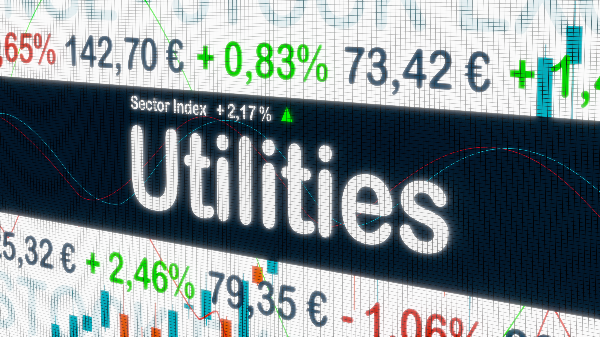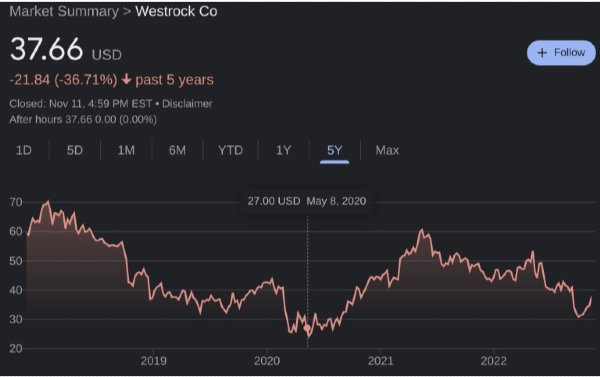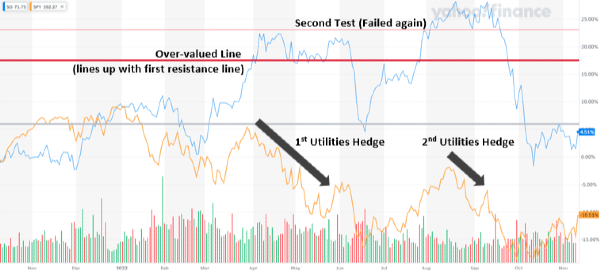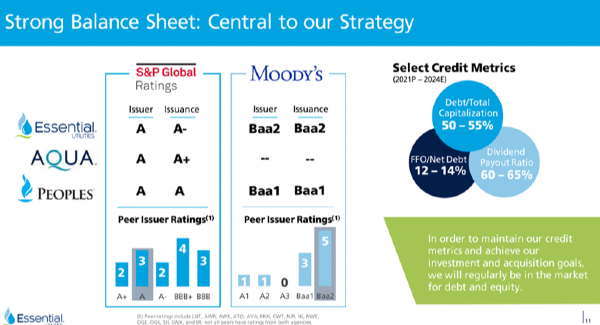Many people today are unaware of the differences between energy and utility stocks. Most people think that investing in utilities also equates to having a share in the energy sector. However, this is far from the reality of things.
Utility stocks are companies that provide some of the basic needs of human life, like electricity companies, water companies, and sewage companies. Energy stocks are companies that are involved in the exploration and transportation of society’s energy sources, like oil companies and gas companies.
These companies are not the same, even though they cater to aspects of society that are essential. So, investing in utilities is not the same as investing in energy stocks. They all come with their various benefits and drawbacks, which you’ll learn about in this article. You’ll also see some of the best energy and utility stocks worth investing in.
What Are Energy Stocks?

Energy stocks are the upstream companies that handle the exploration, refining, or transportation of oil, gas, coal, and other consumable fuels. This category of stocks concerns the production and supply of fuel or electricity and major energy sources on the planet.
In the past, energy stocks only included oil and gas-producing companies. However, innovation in clean energy has changed things. So, energy stocks now include companies that handle renewable energy sources such as wind energy, solar energy, etc.
Investing in Energy Stocks
The energy sector's performance has seen some tremendous improvements over the years. So, many investors are beginning to show interest in this area.
With energy being a necessity for human survival, there is no reason to believe that the energy sector industry will fail. Since this sector is focused on oil, investors can use it to easily access swings in the market. So when oil prices fall, other energy stocks fall as well, and when they rise, other energy stocks rise with them.
The energy stock industry has seen some of the large energy companies offer high dividend yields to all investors. Simply put, there are lots of advantages that come with investing in energy stocks. Along with these advantages, the market has a few disadvantages.
Energy stocks are very volatile, with many wide swings occurring in a single day. Of course, many investors have used these swings to become instant millionaires, and others have become paupers as a result.
Since the energy sector is tied to the global economy, the energy sector stock performance is dependent on the global economy. As a result, if the global economy struggles, as it did during the recent COVID-19 pandemic, the energy sector stock performance will suffer.
Like all investments, everyone wants to invest in the best, as they provide the highest chances of getting a good return. If you want to invest in energy stocks, these are some of the best energy stocks in the world:
- Devon Energy Corporation (DVN)
- Marathon Petroleum Corporation (MPC)
- Exxon Mobil Corporation (XOM)
- Valero Energy Corporation (VLO)
- Chevron Corporation (CVX)
What Is a Utility Stock?

Besides the fuel that drives society, utilities are another aspect that society cannot do without. The utility sector comprises companies that are involved in the provision and control of basic amenities, such as electricity, natural gas, and sewage. This aspect of society is so crucial that it’s regulated both on a federal and a state level in all countries.
As an essential aspect of society, everyone understands that investing in this sector can be a worthwhile venture. Utility stocks are shares in organizations that are involved with the utility sector. Utility stocks can also represent the utility companies that provide these basic amenities to society.
Investing in Utility Stocks
Investing in utilities offers advantages that many investors cannot ignore. The utility sector is a highly regulated one, and this regulation offers highly predictable dividends. So, investing utility stocks will eventually pay since society cannot do without them.
Investing in utilities comes with stability, as the stocks can only go up. Although many investors do not believe in the existence of such a venture, taking care of basic human needs can create one.
Recessions have been the nightmare of investors, as many worthwhile investments have sunk during those periods. However, utility companies are one of the few industries that are untouched by recessions. Sure, there may be a few dips here and there, but they’re largely untouched. This is one aspect that fuels people’s interest, causing them to invest in utility stocks.
Like all investments, investing in utilities comes with its downsides. The biggest downside of investing in utility stocks is that these stocks take their time to grow. While the returns will be worth the investment, the investor will need to be patient enough to wait.
If you want to get the most out of investing utility stocks, you should only invest in large companies. The best utility stocks usually involve a mix of the best electric and water utility companies, and they include:
- Sempra Energy (SRE)
- Clearway Energy Inc. (CWEN)
- Dominion Energy Inc. (D)
- SunRun Inc.
- American Electric Power Company Inc. (AEP)
Are Energy and Utility Stocks the Same?
Although they are both important aspects that society cannot do without, energy and utility stocks are not the same. Energy stocks involve companies that run the energy sector. These companies include both renewable and non-renewable energy companies.
Utility stocks are companies that cater to basic human needs or infrastructure. So, this includes companies that provide water, companies that take care of waste, companies that provide electricity, etc.
Although energy providers and utility companies are not the same, they do need each other. Energy stocks are providers of energy; they source this energy from nature or the ground, and they transport it to utility companies. Utility stocks are companies that use the provided energy sources to offer utilities or basic amenities to consumers.
For example, a coal company or a solar company can act as a source of power for an electricity company. The electricity company will then take this provided power, step it down appropriately, and distribute it to the consumers. So, energy providers and utility companies are not the same, but they support each other when possible.
What Is the Difference Between Them?
We’ve already established that energy and utility stocks are not the same. The various differences between them are examined below:
Investing in utilities is a stable investment that has little chance of failing. On the other hand, energy sector stock performance has shown that energy stocks can fall at any time.
Returns are much more rapid in the energy sector, than in the utility sector.
Utility stocks are also more stable than energy stocks.
Utility stocks are recession-proof since they’re not bound to the global economy like energy stocks.
Conclusion
Energy stocks are not the same as utility stocks, even though they are companies that solve society’s basic needs. Nonetheless, some of these energy and utility companies, like electric utility companies and coal companies, need each other to function.
Frequently Asked Questions (FAQ)
Is Energy and Utilities the Same?
No, energy and utilities are not the same. Where energy involves sources of fuel, utilities are companies that transform those energy sources into usable infrastructure or useful forms for human use.
What Is Energy and Utilities?
Energy is a source of power or fuel in its raw form. Utilities are created when these energy sources have been transformed into human-usable forms.
What Is the Difference between Energy and Utility Stocks?
Energy stocks are companies that are involved in the exploration, transportation, and refining of renewable and non-renewable fuel sources. While utility stocks are companies that turn these fuels into infrastructure, amenities, and other structures that are important to human life.
Is Energy Considered a Utility?
Energy can only be considered a utility when it has been transformed into a form that fulfills a basic need for society. Hence, wind energy can become a utility once it has been transformed into electricity.






























Many people today are unaware of the differences between energy and utility stocks. Most people think that investing in utilities also equates to having a share in the energy sector. However, this is far from the reality of things.
Utility stocks are companies that provide some of the basic needs of human life, like electricity companies, water companies, and sewage companies. Energy stocks are companies that are involved in the exploration and transportation of society’s energy sources, like oil companies and gas companies.
These companies are not the same, even though they cater to aspects of society that are essential. So, investing in utilities is not the same as investing in energy stocks. They all come with their various benefits and drawbacks, which you’ll learn about in this article. You’ll also see some of the best energy and utility stocks worth investing in.
What Are Energy Stocks?
Energy stocks are the upstream companies that handle the exploration, refining, or transportation of oil, gas, coal, and other consumable fuels. This category of stocks concerns the production and supply of fuel or electricity and major energy sources on the planet.
In the past, energy stocks only included oil and gas-producing companies. However, innovation in clean energy has changed things. So, energy stocks now include companies that handle renewable energy sources such as wind energy, solar energy, etc.
Investing in Energy Stocks
The energy sector's performance has seen some tremendous improvements over the years. So, many investors are beginning to show interest in this area.
With energy being a necessity for human survival, there is no reason to believe that the energy sector industry will fail. Since this sector is focused on oil, investors can use it to easily access swings in the market. So when oil prices fall, other energy stocks fall as well, and when they rise, other energy stocks rise with them.
The energy stock industry has seen some of the large energy companies offer high dividend yields to all investors. Simply put, there are lots of advantages that come with investing in energy stocks. Along with these advantages, the market has a few disadvantages.
Energy stocks are very volatile, with many wide swings occurring in a single day. Of course, many investors have used these swings to become instant millionaires, and others have become paupers as a result.
Since the energy sector is tied to the global economy, the energy sector stock performance is dependent on the global economy. As a result, if the global economy struggles, as it did during the recent COVID-19 pandemic, the energy sector stock performance will suffer.
Like all investments, everyone wants to invest in the best, as they provide the highest chances of getting a good return. If you want to invest in energy stocks, these are some of the best energy stocks in the world:
What Is a Utility Stock?
Besides the fuel that drives society, utilities are another aspect that society cannot do without. The utility sector comprises companies that are involved in the provision and control of basic amenities, such as electricity, natural gas, and sewage. This aspect of society is so crucial that it’s regulated both on a federal and a state level in all countries.
As an essential aspect of society, everyone understands that investing in this sector can be a worthwhile venture. Utility stocks are shares in organizations that are involved with the utility sector. Utility stocks can also represent the utility companies that provide these basic amenities to society.
Investing in Utility Stocks
Investing in utilities offers advantages that many investors cannot ignore. The utility sector is a highly regulated one, and this regulation offers highly predictable dividends. So, investing utility stocks will eventually pay since society cannot do without them.
Investing in utilities comes with stability, as the stocks can only go up. Although many investors do not believe in the existence of such a venture, taking care of basic human needs can create one.
Recessions have been the nightmare of investors, as many worthwhile investments have sunk during those periods. However, utility companies are one of the few industries that are untouched by recessions. Sure, there may be a few dips here and there, but they’re largely untouched. This is one aspect that fuels people’s interest, causing them to invest in utility stocks.
Like all investments, investing in utilities comes with its downsides. The biggest downside of investing in utility stocks is that these stocks take their time to grow. While the returns will be worth the investment, the investor will need to be patient enough to wait.
If you want to get the most out of investing utility stocks, you should only invest in large companies. The best utility stocks usually involve a mix of the best electric and water utility companies, and they include:
Are Energy and Utility Stocks the Same?
Although they are both important aspects that society cannot do without, energy and utility stocks are not the same. Energy stocks involve companies that run the energy sector. These companies include both renewable and non-renewable energy companies.
Utility stocks are companies that cater to basic human needs or infrastructure. So, this includes companies that provide water, companies that take care of waste, companies that provide electricity, etc.
Although energy providers and utility companies are not the same, they do need each other. Energy stocks are providers of energy; they source this energy from nature or the ground, and they transport it to utility companies. Utility stocks are companies that use the provided energy sources to offer utilities or basic amenities to consumers.
For example, a coal company or a solar company can act as a source of power for an electricity company. The electricity company will then take this provided power, step it down appropriately, and distribute it to the consumers. So, energy providers and utility companies are not the same, but they support each other when possible.
What Is the Difference Between Them?
We’ve already established that energy and utility stocks are not the same. The various differences between them are examined below:
Investing in utilities is a stable investment that has little chance of failing. On the other hand, energy sector stock performance has shown that energy stocks can fall at any time.
Returns are much more rapid in the energy sector, than in the utility sector. Utility stocks are also more stable than energy stocks. Utility stocks are recession-proof since they’re not bound to the global economy like energy stocks.
Conclusion
Energy stocks are not the same as utility stocks, even though they are companies that solve society’s basic needs. Nonetheless, some of these energy and utility companies, like electric utility companies and coal companies, need each other to function.
Frequently Asked Questions (FAQ)
Is Energy and Utilities the Same?
No, energy and utilities are not the same. Where energy involves sources of fuel, utilities are companies that transform those energy sources into usable infrastructure or useful forms for human use.
What Is Energy and Utilities?
Energy is a source of power or fuel in its raw form. Utilities are created when these energy sources have been transformed into human-usable forms.
What Is the Difference between Energy and Utility Stocks?
Energy stocks are companies that are involved in the exploration, transportation, and refining of renewable and non-renewable fuel sources. While utility stocks are companies that turn these fuels into infrastructure, amenities, and other structures that are important to human life.
Is Energy Considered a Utility?
Energy can only be considered a utility when it has been transformed into a form that fulfills a basic need for society. Hence, wind energy can become a utility once it has been transformed into electricity.